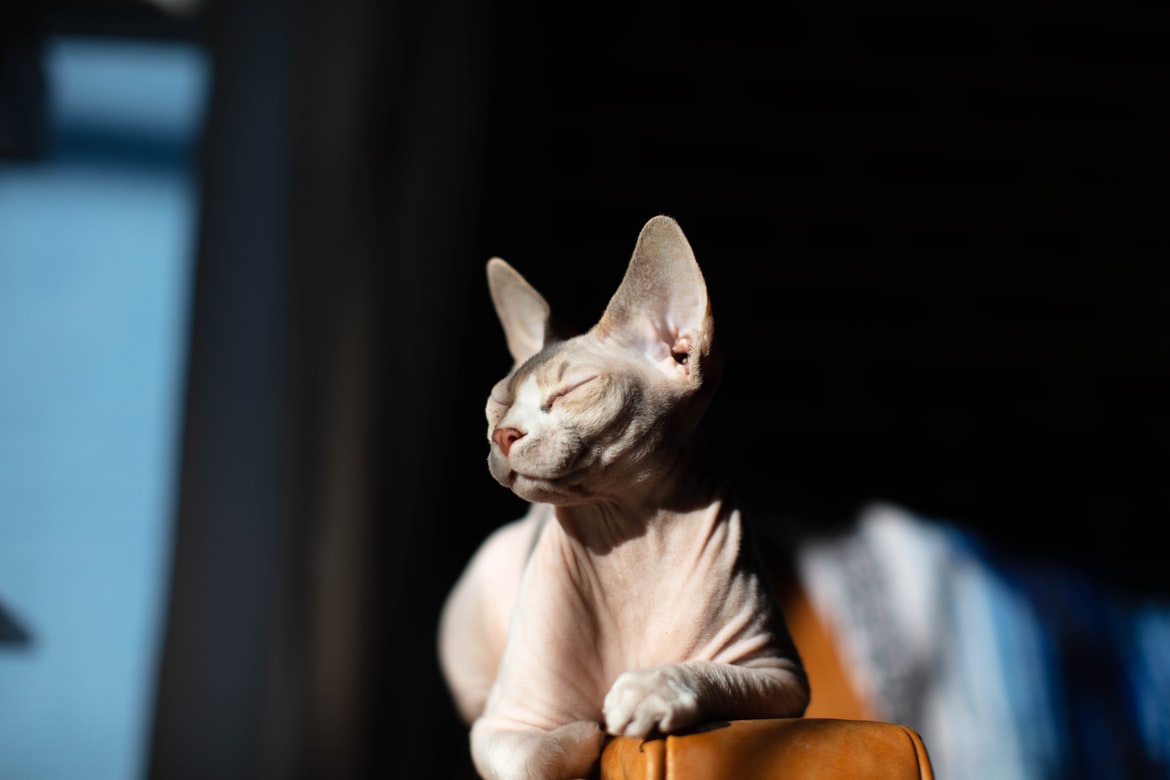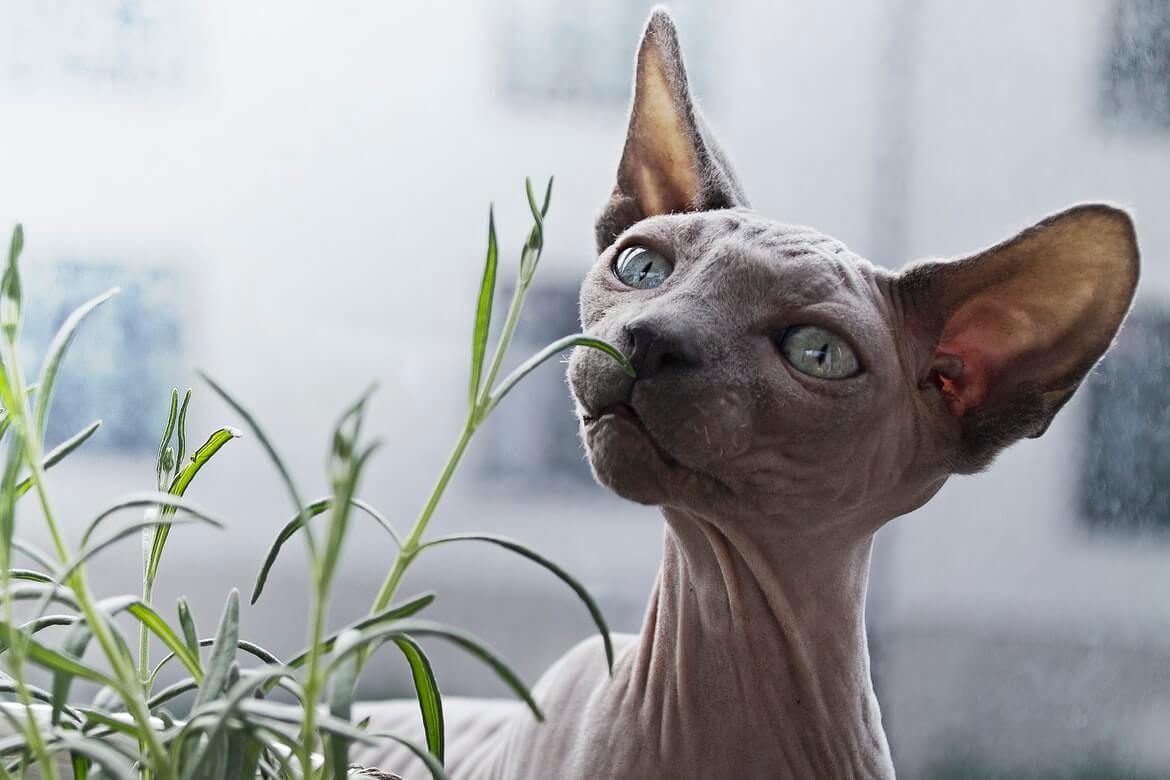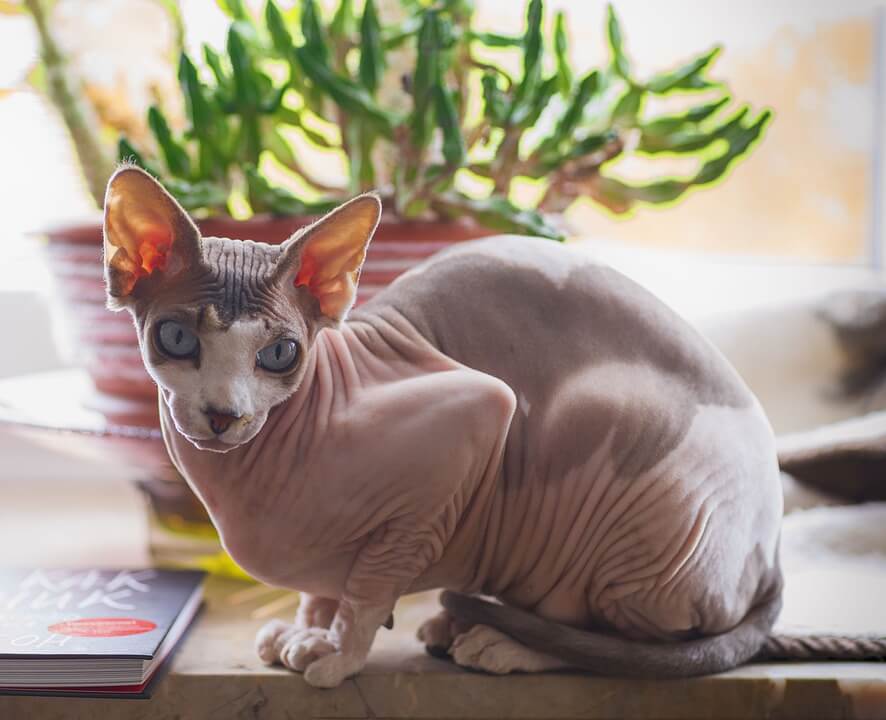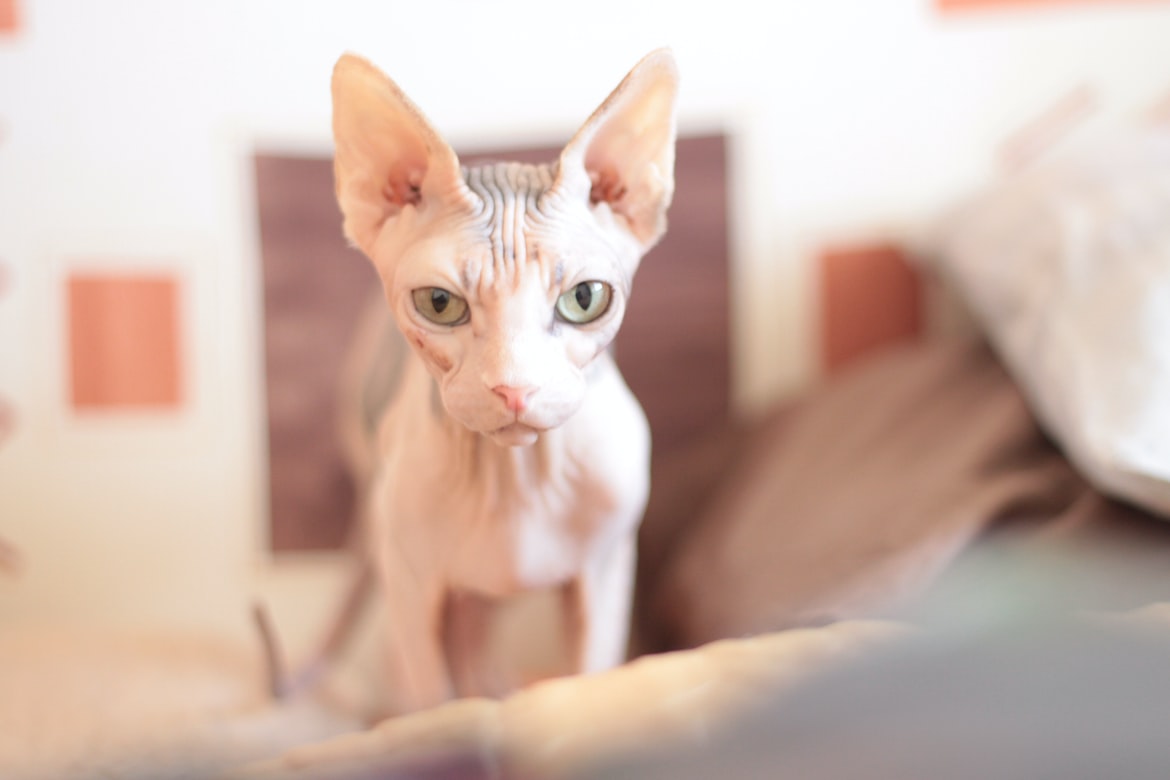Sphynx cat
Does the Sphynx appear to be a paradox: a hairless cat? However, this bald yet gorgeous kitty quickly enchants people who know him. His friendliness, intelligence, and exotic look all combine to make him a cat lover's favorite. Sphynx cats are recognized for their bare appearance, but they are much more than that. They are gorgeous, intelligent, and affectionate cats. Discover what it's like to share your home with a sphynx.
Weight
- Male: 8-14 lbs
- Female: 6-14 lbs
Height
- Male: 8-10 inches
- Female: 8-10 inches
Lifespan
- 9-15 years
Appearance

The Sphynx is a medium-sized cat that weighs between 6 and 12 pounds. They have no fur and are coated in tiny hairs on their sleek, muscular bodies. The physique has a delicate bone structure yet is muscular, with a barrel chest. This gives them a chamois-like feel and a bald and wrinkled look. They have a wedge-shaped head that looks like a Devon Rex's, with prominent cheekbones big ears; their eyes are lemon-shaped and have a deep set. The legs are long and thin, and the barrel chest gives them a bow-legged look. In comparison to other cat breeds, their paw pads are significantly thicker, which contributes to the attractiveness of their unique appearance. The tail is long and tapered, and it is quite hard to touch.
A Sphynx's most distinguishing trait is that it lacks a coat of fur! However, these cats are not completely hairless and coated in thin, downy hair that resembles peach skin. There are no whiskers or eyelashes on this cat.
Sphynxes come in a variety of hues and designs. They can be plain (white, black, red, brown, lavender) or patterned (white, black, red, brown, lavender) (bicolor, calico, tabby, tortoiseshell, pointed, and mink). Color and pattern are visible in the pigment of their skin, making them more difficult to identify from coated cats.
Temperament
The Sphynx is a very active and loving cat and is often found on laptops or televisions, in sunny windows, or under blankets, seeking heat. The Sphynx has an outgoing attitude and likes entertaining. They are frequently the first to greet visitors to their house.
Sphynxes are vivacious cats who execute aerialist feats akin to monkeys from the tops of doors and bookcases. They are very dedicated and faithful to their people, wagging their tails in a dog-like manner, kneading with their padded toes, and purring with happiness at the pleasure of being near their loved ones. They are as naughty(and adorable) and require your undivided attention. Despite their strange look, they are unique cats, with all the mystery and allure that has enthralled humans for thousands of years. While the Sphynx may not be for everyone, its distinct look and endearing personality have earned it a devoted following.
Living Conditions

Sphynx is a high energy cat breed that needs plenty of mental and physical stimulation. Toys and scratching posts can keep them engaged, but they want the attention and care of their favorite humans to be truly satisfied. Because these friendly animals can't be left alone for lengthy periods, they'll need a loving owner with plenty of attention and affection.
Sphynxes like chasing ping-pong balls and tossing feather toys, but climbing and perching are two of her favorite pastimes. She can perch on any ledge, no matter how high the bookshelf or how little the ledge is. Sphynxes flourish in homes with plenty of room, cat trees, and owners who don't mind their homes becoming jungle gyms.
Sphynxes are cold-sensitive most of the time; your sphynx will be located in warm places of the house, such as a sunny window, a heated vent, or even under the covers with you. Keep your kitten warm with a fluffy and stylish sweater or coat if you live in a cold climate.
On the other hand, their nakedness has advantages: A sphynx is more tolerant of water than other cats, which is advantageous because its hairless body needs frequent bathing. The sphynx is considered hypoallergenic due to its lack of fur. While no pet can be entirely hypoallergenic, they can be a great alternative for cat enthusiasts who sneeze or itch when they're around cats.
Sphynxes are gentle, easygoing creatures who get along well with children, household pets, and other cats, especially if introduced as kittens.
Care

You should probably rethink getting a Sphynx if you believe you won't have to spend any time grooming him. To avoid blocked pores and greasy stains on your furnishings or clothing, his body gets oily and must be washed anywhere from weekly to monthly. By the time you acquire your Sphynx kitten, he will have had a few showers, but that doesn't guarantee he will enjoy being showered. He'll probably like the attention if you make it a pleasant occasion.
The Sphynx, like any other cat, requires regular nail trimming, eye and ear cleaning, and dental care. Their claws can accumulate a waxy coating that must be removed regularly. It's also important to clean their eyes off any accumulated mucus. Waxy accumulation in the ears can also occur, necessitating frequent cleaning with cotton and a mild ear cleaning solution prescribed by your veterinarian. Brush their teeth with pet toothpaste for overall health and fresh breath.
Health
The sphynx cat is a robust and resilient breed with few health issues. Sphynx cats have suffered from a few health issues, even though the breed has no hereditary illness predispositions.
Hypertrophic Cardiomyopathy is the most prevalent cardiac condition in cats, and it's also a concern in the Sphynx community. It causes a thicker "pump muscle," which causes breathing problems to develop over time. Although the illness cannot be cured, proper veterinary care can significantly enhance a cat's quality of life. Respiratory problems in kittenhood Sphynx kittens are more susceptible to lung infections and other respiratory problems due to their lack of hair. Early detection and therapy go a long way toward assisting your cat in overcoming these issues.
Hereditary myopathy is a kind of myopathy that runs in families. Muscle weakness and walking problems are common symptoms of this disease. With the appropriate kind of expert care, cats may live a normal lifespan with it.
Problems with digestion can arise. Sphynx cats are more prone to various gastrointestinal issues than normal cats. While most of these will go away on their own, others will require longer-term monitoring and therapy.
Infection of the eye. Infections are still prevalent, even if you are vigilant about keeping your buddy's eyes clean. Treatment generally consists of drops; however, severe instances may need more intense or long-term treatment.
The sphynx is not considered hypoallergenic despite their lack of hair since their skin generates typical levels of allergy-causing dander. Sphynx cats have oily skin and should be washed regularly to prevent becoming greasily. Although the sphynx is adept at finding comfortable spots to snuggle up and get warm, special care should be given to protect these cats from sunburn and skin injury, as well as freezing temperatures. Despite this, commercially marketed sphynx sweaters and jackets are available. Wax accumulation in the ears should be examined regularly and gently wiped away with a cotton ball soaked in a mild ear-cleaning solution as needed.
History

The hairless Sphynx is one of the cat breeds that developed by chance. Elizabeth, a black and white domestic cat in Toronto, Canada, gave birth to a hairless kitten due to a genetic abnormality. Elizabeth's owner realized Prune, the kitten's name, was one-of-a-kind and set out to replicate him. He was bred to furred cats, notably the Devon Rex and other hairless kittens produced in the mid-to-late 1970s. Because the hairlessness gene is recessive, some kids were hairless while others were furry.
According to The International Cat Association, the unusual breed was originally known as Canadian Hairless Cats, but breeders eventually settled on the name Sphynx, a reference to the massive limestone sculpture in the Egyptian desert that has been worn smooth over millennia by wind, sand, and water. The American Cat Fanciers Association, the Cat Fanciers Association, the International Cat Association, and other cat registries recognized the Sphynx in 2002.
Final Thoughts
The sphynx cat is an acrobatic, lively entertainer who enjoys strutting about for attention. They have an unexpected sense of humor, which contrasts with their solemn demeanor.
This affectionate cat will follow you about the home and attempt to be involved in whatever you're doing, snatching every chance to perch on your shoulder or cuddle up in your lap. They may be a handful since they are as curious and clever as they are active. The sphynx should only be kept indoors and gets along well with youngsters and other pets. While the Sphynx may not be for everyone, its distinct look and endearing personality might be the cat you are looking for.








Comments